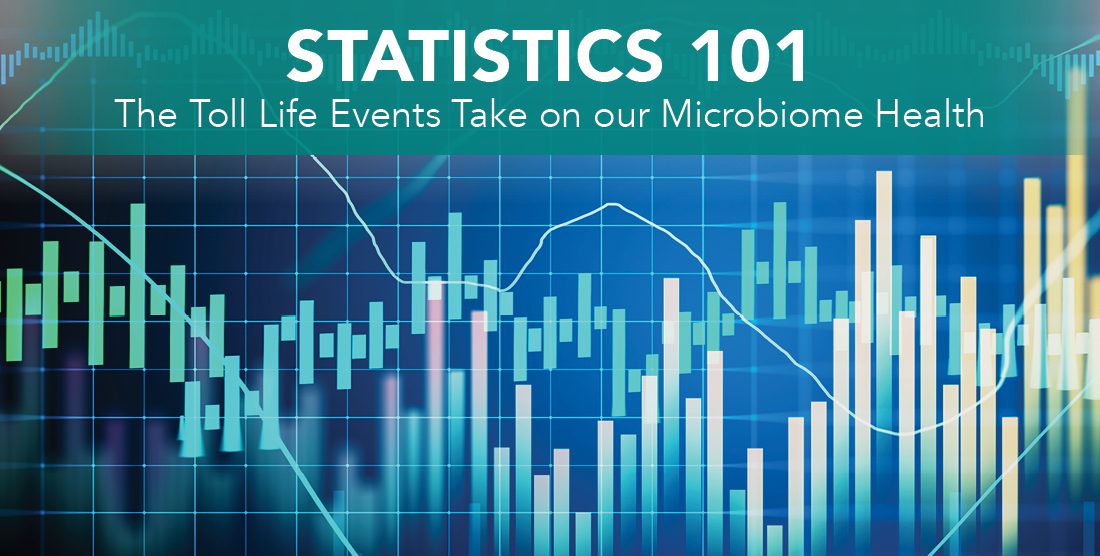
Digestive Health Series: Statistics 101
STATISTICS 101 — The Toll Life Events Take On Our Microbiome Health
In this intro course we will assess the toll that certain decisions and events, like overindulging, stress, sleep loss and holidays, take on our microbiome health. We will evaluate statistical data to support the how widespread the concern is.
Chapter 1: How Life Events Impacts Our Health
In today’s fast-paced society, stress is a daily part of life. Just think about it — how stressful is your commute to work? According to the U.S Census Bureau, it now takes the average worker 26 minutes to travel to work. That’s the longest it’s been since the Census began tracking this data in 1980. Half the time you’re running late, there is traffic and you just hit two red lights…in a row! Your day can become stressful in an instant.
Even annual events like the winter holiday season that most people look forward to only compounds the amount of stress you already are experiencing. For example, according to NBC News1 45% of Americans would prefer to skip Christmas due to the “extreme stress” the holiday season brings, like the lack of time and money, as well as the pressure to give or get gifts.
While we may want to push our difficulties aside or pretend they don’t exist, how we deal with these situations is of prime importance to our mental and physical health.
Short-Term Stress vs Prolonged (Chronic) Stress
Research has shown that the stress response is an essential survival mechanism, which for most situations in life can be a good thing3. It helps to increase our reaction time, concentration and alertness and prepares the body for “flight or fight.”
When the stress response becomes prolonged (chronic) like when losing a job or a family member, our attention, memory, and the way we deal with emotions can be negatively impacted. This long-term stress can contribute to both physical and mental illness through effects on the heart and brain.
Top 10 Stressors:
- Having enough in emergency savings – 41%
- Job security – 39%
- Income fluctuations – 29%
- Paying utilities – 28%
- Paying rent or mortgage – 28%
- Financial market volatility – 25%
- Paying down/off credit card debt – 23%
- Having enough saved for retirement – 23%
- Paying health care bills – 19%
- Putting off major financial decisions – 17%
2The survey was conducted online by The Harris Poll, on behalf of NEFE, from April 7-9, 2020, among more than 2,000 U.S. adults.
Chapter 2: How Stress Leads to Poor Health Choices
During stressful times we fall into destructive habits. We make poor choices, sometimes unconsciously or without reason just to take our minds off of our stressful situations. We all know that our diet can impact our health, but few people know just how profoundly it interacts with the beneficial bacteria housed in our gut.
Fast Food Lifestyle Wreaking Havoc
Everyone’s microbiome is as unique as a fingerprint and is altered by everything we encounter. Overindulging in unhealthy foods can have a significant impact on your health and your microbiome. When you’re pressed for time, home cooked meals are usually the first casualty.
In fact, according to the CDC, over one-third of adults (36.3%) consume fast food on a given day. This reliance on getting quick, easy, and high caloric food is a main reason why over 73% of adults 20 and over are overweight4. In addition to expanding our waistlines, fast food has a significant toll on our gut microbes and your immune system. Diets high in fat and calories can contribute to obesity due to an altered gut microbiota.
The Connection of Stress to Lack of Sleep
Stress and anxiety often lead to insomnia and sleep problems. By the same token, lack of proper rest can contribute to stress. In fact, 35.2% of all adults in U.S. 18+ years old, don’t get the needed 7 or more hours a sleep per night5.
2020 just made it a little worse. It was a tough year with many experiencing sleepless nights wondering if they were going to have a job to pay their bills. With unemployment rates at their worst since the Great Depression, it’s not surprising that 48% of U.S. adults report losing sleep, at least occasionally, about a money issue6.
Top it off with reduced or no exercise, and little self-care time for relaxing, you have the perfect storm to affect the wellness of your microbiome.
UP NEXT
Stay tuned to learn more about second course, ANATOMY 201 coming April 12th on AllAboutMannatech.com
Chapter 1 & 2 Sources:
- https://allonehealth.com/holiday-stress-guide/
- https://www.nefe.org/news/2020/04/survey-covid-19-crisisi-causing-financial-stress.aspx
- https://www.mqmentalhealth.org/stress-and-mental-health/
- https://www.cdc.gov/nchs/fastats/obesity-overweight.htm
- https://www.cdc.gov/sleep/data_statistics.html
- https://www.bankrate.com/finance/credit-cards/losing-sleep-survey/
SERIE DE SALUD DIGESTIVA: CURSO #1
PUNTOS BÁSICOS DE LAS ESTADÍSTICAS:
La factura que los eventos de la vida pasan a la salud del microbioma
En este curso de introducción evaluaremos el costo que algunas decisiones y eventos, como comer de más, el estrés, la falta de sueño y los días festivos, pueden tener sobre la salud de nuestro microbioma. Evaluaremos los datos estadísticos para respaldar esta preocupación.
Capítulo 1: De qué forma los eventos de la vida impactan a nuestra salud
En el rápido paso de la vida de hoy en día, el estrés es parte de nuestra vida cotidiana. Solo piensa en esto: ¿Qué tan estresante es tu traslado al trabajo? De acuerdo con la Oficina del Censo de EE. UU., ahora toma un promedio de 26 minutos a los trabajadores llegar a sus trabajos. Eso es el tiempo más largo desde que el Censo empezó a darle seguimiento a esta información en 1980. La mitad del tiempo vamos tarde, hay tráfico y nos topamos con dos semáforos en rojo… ¡consecutivos! Tu día puede hacerse estresante en un instante.
Incluso los eventos anuales como en la temporada de fiestas de invierno la mayoría de las personas acumulan más cantidad de estrés del que ya tienen. Por ejemplo, de acuerdo con NBC News1, el 45 % de los estadounidenses preferirían saltarse la Navidad debido al “estrés excesivo” que trae la temporada de fiestas, como la falta de dinero y tiempo, así como la presión para dar regalos.
Mientras que nosotros queremos hacer a un lado las dificultades o hacer de cuenta que no existe, la forma en que lidiamos con estas situaciones es de suma importancia para nuestra salud mental y física.
Estrés de corto plazo vs. Estrés prolongado (crónico)
Las investigaciones han mostrado que la respuesta del estrés es un mecanismo esencial de supervivencia, que en la mayoría de las situaciones de la vida puede ser algo bueno3. Ayuda a incrementar nuestro tiempo de reacción, concentración y estado de alerta, y prepara al cuerpo para “escapar o luchar”.
Cuando la respuesta de estrés se convierte en prolongado (crónico) como cuando se pierde un trabajo o muere un miembro de la familia, nuestra atención, memoria y la forma en que lidiamos con las emociones pueden verse afectadas de forma negativa. Este estrés de largo plazo puede contribuir a enfermedades físicas o mentales a través de efectos al corazón y al cerebro.
10 Principales Causas del Estrés:
- Tener suficientes ahorros de emergencia – 41%
- Seguridad de trabajo – 39%
- Fluctuaciones de ingresos – 29%
- Pagar servicios públicos – 28%
- Pagar renta o crédito hipotecario – 28%
- Volatilidad del mercado financiero – 25%
- Pagar la deuda en tarjeta de crédito – 23%
- Tener suficientes ahorros para el retiro – 23%
- Pagar las cuentas de atención de salud – 19%
- Posponer las decisiones financieras importantes – 17%
2La encuesta se realizó en línea por The Harris Poll, a nombre de NEFE, del 7 al 9 de abril de 2020, entre más de 2,000 adultos estadounidenses.
Capítulo 2: De qué forma el estrés da pie a malas decisiones de salud
Durante momentos de estrés caemos en hábitos destructivos. Tomamos malas decisiones, en ocasiones de forma inconsciente o sin razón solo para quitar nuestras mentes de las situaciones estresantes. Todos sabemos que nuestra dieta puede afectar nuestra salud, pero pocas personas saben qué tan profundamente interactúa con la bacteria benéfica alojada en el tracto gastrointestinal.
El estilo de vida de la comida rápida crea daños
El microbioma de las personas es tan único como la huella dactilar y se altera con todas las cosas que encontramos. Excedernos en alimentos poco saludables puede tener un impacto importante sobre tu salud y la de tu microbioma. Cuando estamos presionados por tiempo, lo primero que dejamos atrás son los alimentos cocinados en casa.
De hecho, de acuerdo el CDC, más de un tercio de los adultos (36.3 %) consume comida rápida en un día cualquiera. La confianza de obtener comida rápida, fácil, y alta en calorías es la principal razón por la cual el 73 % de los adultos mayores de 20 años tiene sobre peso4. Además de aumentar el tamaño de nuestras cinturas, la comida rápida tiene un efecto importante sobre los microbiomas de nuestro tracto gastrointestinal y sobre nuestro sistema inmunitario. Las dietas altas en grasas y calorías pueden contribuir a la obesidad debido a una microbiota alterada en el tracto gastrointestinal.
La conexión entre el estrés y la falta de sueño
El estrés y la ansiedad a menudo dan pie al insomnio y a problemas de sueño. Al mismo tiempo, la falta de descanso apropiado puede contribuir al estrés. De hecho, 35.2% de todos los adultos en EE. UU. de 18 años de edad o mayores, no obtienen las 7 horas o más de sueño necesarias por noche5.
El año 2020 empeoró las cosas un poco más. Fue un año difícil con muchas personas experimentando noches sin dormir, preguntándose si iban a tener trabajo para pagar sus cuentas. Con las tasas de desempleo más malas desde la Gran Depresión, no es sorprendente que el 48 % de los adultos de EE. UU. reporten falta de sueño, por lo menos ocasionalmente, debido a problemas de dinero6.
Si a eso agregamos la falta de ejercicio, y el poco tiempo de autocuidado para relajarnos, tenemos la tormenta perfecta para afectar el bienestar de tu microbioma.
SIGUIENTE
Mantente al pendiente del segundo curso, 2. PUNTOS BÁSICOS DE LA ANATOMÍA el 12 de abril en AllAboutMannatech.com.
Fuentes de los capítulos 1 y 2:
- https://allonehealth.com/holiday-stress-guide/
- https://www.nefe.org/news/2020/04/survey-covid-19-crisisi-causing-financial-stress.aspx
- https://www.mqmentalhealth.org/stress-and-mental-health/
- https://www.cdc.gov/nchs/fastats/obesity-overweight.htm
- https://www.cdc.gov/sleep/data_statistics.html
- https://www.bankrate.com/finance/credit-cards/losing-sleep-survey/
消化系统健康系列课程:课程 #1
统计 101
日常活动对人体微生物群系健康造成的不利影响
在这一入门课程中,我们将评估暴饮暴食、压力、失眠和假期等事件对人体微生物群系健康造成的不利影响。我们将根据统计数据,确定这些不利影响的广泛程度。
第 1 部分:日常活动是如何影响我们身体健康的
在如今快节奏的社会中,压力是日常生活的一部分。想想吧,每天上班路上的压力有多大?根据美国人口普查局相关统计数据显示,目前就业人员平均通勤时长为 26 分钟。自 1980 年人口普查开始统计这些数据以来,目前通勤时长已达到最长。半数时间都几乎快要迟到,交通堵塞,一路红灯!仅一瞬间,就压力满满。
即便是每个人期盼的冬季假期,也只会加重您已承受的压力。例如,NBC 新闻曾报道1,有 45% 的美国人更愿意跳过圣诞节,因为圣诞节给他们带来了“极大的压力”,包括缺少时间和资金的压力、买礼物和收礼物的压力。
我们想把困难置之不理,或假装它们不存在,但是如何应对这些情形对我们的身心健康至关重要。
短期压力 vs 长期(慢性)压力
研究表明,压力反应是一项重要的生存机制。面对大多数日常情况,压力反应都能发挥积极正面的作用3。压力反应有助于增加反应时间,引起注意和警觉,使我们的身体进入“回避或对抗”的状态。
当面对失业或亲人离世时,压力反应会延长(成为慢性压力),我们的注意力、记忆力以及处理感情的方式都会受到负面影响。长期压力会对心脑器官造成损害,从而会导致生理或心理疾病。
十大压力源:
- 应急储蓄是否充足 – 41%
- 工作是否有保障 – 39%
- 收入是否稳定 – 29%
- 货币购买力是否坚挺 – 28%
- 租金或贷款压力 – 28%
- 金融市场动荡 – 25%
- 偿还信用卡债务 – 23%
- 退休金是否已预备充足 – 23%
- 支付医疗服务费用 – 19%
- 推迟重大财务决定 – 17%
2该调查由美国国家金融教育基金会 (NEFE) 委托美国哈里斯民意调查机构 (The Harris Poll) 在 2020 年 4 月 7 日到 9 日在网上进行,调查对象为 2000 余名美国成年人。
第 2 部分:压力为什么会使我们作出不利于健康的选择
压力很大的时候,我们会养成不良生活习惯。我们有时会无意识地或者无缘无故地作出不利于健康的选择,只是为了将自己的思绪从压力中解脱出来。众所周知,我们的饮食可以影响我们的健康状况,但是很少有人知道饮食对于我们肠道中的有益菌群有多么大的影响。
快餐生活方式损害健康
每个人体内的微生物群系和指纹一样,都是独一无二的,而且每个人体内的微生物群系都会因为各种因素而发生变化。过度沉溺于不健康食品,会显著损害您的健康和微生物群系。当您需要赶时间时,通常不会选择自己做饭吃饭。
美国疾病控制与预防中心 (CDC) 表示,36.3% 的成年人日常会选择吃快餐。在 20 岁及以上的人群中,有 73% 的人超重,对于快捷、简单、高热量食品的依赖是导致这一结果的一个主要原因4。快餐除了增加我们的腰围,还对我们肠道中的微生物群系和免疫系统造成了重大损害。高脂肪、高热量食品会导致肥胖,是因为这一类食品改变了肠道微生物群系。
压力与失眠的关系
压力和焦虑经常会引发失眠和其他睡眠问题。反过来,缺乏休息也会增大压力。实际上,在美国已满 18 周岁的成年人人群中,35.2% 的人每天晚上睡不满 7 小时及以上的必需睡眠时间5。
2020 年,情况更加糟糕。在这艰难的一年里,许多人为生计发愁,夜不能寐。自“大萧条”时期至今,美国失业率再达新低,也难怪 48% 的美国成年人会因为财务问题(至少偶尔)而失眠6。
再加上缺乏锻炼或不锻炼,自我放松的时间短暂,让人体内微生物群系的健康状况雪上加霜。
下一页
敬请关注第二门课程剖析 201,该课程将于 4 月 12 日在 AllAboutMannatech.com 上线。
第 1 部分及第 2 部分资料来源:
- https://allonehealth.com/holiday-stress-guide/
- https://www.nefe.org/news/2020/04/survey-covid-19-crisisi-causing-financial-stress.aspx
- https://www.mqmentalhealth.org/stress-and-mental-health/
- https://www.cdc.gov/nchs/fastats/obesity-overweight.htm
- https://www.cdc.gov/sleep/data_statistics.html
- https://www.bankrate.com/finance/credit-cards/losing-sleep-survey/



















